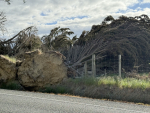COWS THAT have become ill, with some dying, after grazing on swede crops has seen veterinarians in Southland practices at the forefront of dealing with this animal health issue.
"Veterinary practices in Southland first noticed unusual signs of liver disease in autopsies of cows on swedes in July," says Dr Mark Bryan, of the New Zealand Veterinary Association.
"We then started to go back and look at unusual cases in winter prior to that, and work forward collecting more bloods and post mortem samples to complete the picture. We have been finding significant liver and sometimes kidney damage in many cases. Investigations are continuing and we have collected huge amounts of data from over 40 farms and are now helping DairyNZ to get more of the answers we need to address this problem.
"Symptoms for cows that have eaten swedes in the region include photosensitivity, weight loss and/or ill thrift. There is increased mortality and animals appear to be more susceptible to other diseases. We are monitoring farms to determine any chronic or long-term subclinical effects.
"If symptoms appear we encourage farmers to stop feeding swedes to their cows and to provide an alternative feed, along with water and shade for any animal showing signs of photosensitivity, and to contact their vet. We are also suggesting that if farmers are concerned, they get a proportion of their cows blood sampled to determine the extent, if any, of liver damage."
Information from PGGW has confirmed the veterinarians' initial suspicion that the HT variety of swedes is linked to the majority of cases.
"We will continue to work closely with Dairy NZ and other rural health professionals to further understand the cause and provide more advice to farmers."
Dr Bryan says that veterinarians have helped set up a working group to be led by DairyNZ and that Southland veterinary practices are in close contact and working together.











